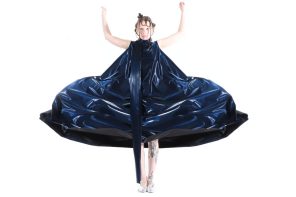Anna Vidal Frugone began her fashion journey at a very young age. From fashion sketches to helping her mother and grandmother, both who have always enjoyed making many of their own garments and taught Frugone how to sew.
Frugone studied in Barcelona for a year before she moved to New Zealand to continue with a Bachelor of Fine Arts with Honours at Whitecliffe.
Last year, Frugone interned at Rue de Seine, an international bohemian bridal company. She was part of the cutting support team, checking for flaws on fabrics as well as contributing to the final quality control checks before shipping.
“I learnt about the importance of the small details in the finished garments, and also learnt a lot about the inner workings of a professional atelier,” said Frugone.
In 2018, Frugone received the New Zealand Prime Minister Scholarship for Asia, which allowed her to travel to India with 11 other recipients from Whitecliffe. She visited local artisans and learnt about traditional crafts and sustainable practices.
“The experience helped me develop a new awareness about the value of these crafts and the importance of sustaining traditional practices.”
It was not until Frugone was studying at Whitecliffe, did she realise that the fashion industry was responsible for 10 percent of annual global carbon emissions whilst 80 percent of the garment’s ecological impact is determined at the design stage. This meant that we have many opportunities to induce a big change in the industry.
“We all have to shift our mentality and start thinking about the ethical and environmental impact of our actions, not only on our everyday lives but also on our fashion practices. As wearers, we have an obligation to consider the well-being of the makers of our garments, by investing in long-lasting quality pieces we are rewarding the expertise and skill of the designers and makers.”
After studying at the leading institute in sustainable fashion, Frugone believes that being knowledgeable about the different ethical and sustainable practices will prove to be a very useful and employable asset during this time.
In Frugone’s Honours project, she has explored the themes of craft, value, memory, and storytelling. Central to the design of this collection was the upcycling of her mother’s wedding dress which has been distributed throughout each of the pieces.
“I have embroidered over this significant fabric, with the intention of leaving my trace on the textile, infusing the process with a personal narrative while highlighting the value of craft and the art of making,” explained Frugone.
Frugone believes that all garments have a story to tell, hidden in the wrinkles, stains, tears, a physical record of the body’s inhabitation.
“As a way of including these markers into my garments, I used a fabric furrowing technique to create swirling folds and crests that simulate wrinkles, embroidered patterns that echo natural wrinkles, as well as simulating small holes and symbolic stains.”
Further, Frugone makes the effort to continue and elevate the importance of handcrafts and sustainable slow fashion practices. To do this, she has hand embroidered, hand-gathered ruffles, and hand-sewn parts of her garments, thereby creating durable garments that can accumulate history and value for many years to come. To reduce environmental impact in the production of her collection, Frugone incorporated specific making techniques and ensured minimal waste was produced when cutting. Moreover, she used silk fabrics and cotton thread, making the collection 100 percent compostable.






